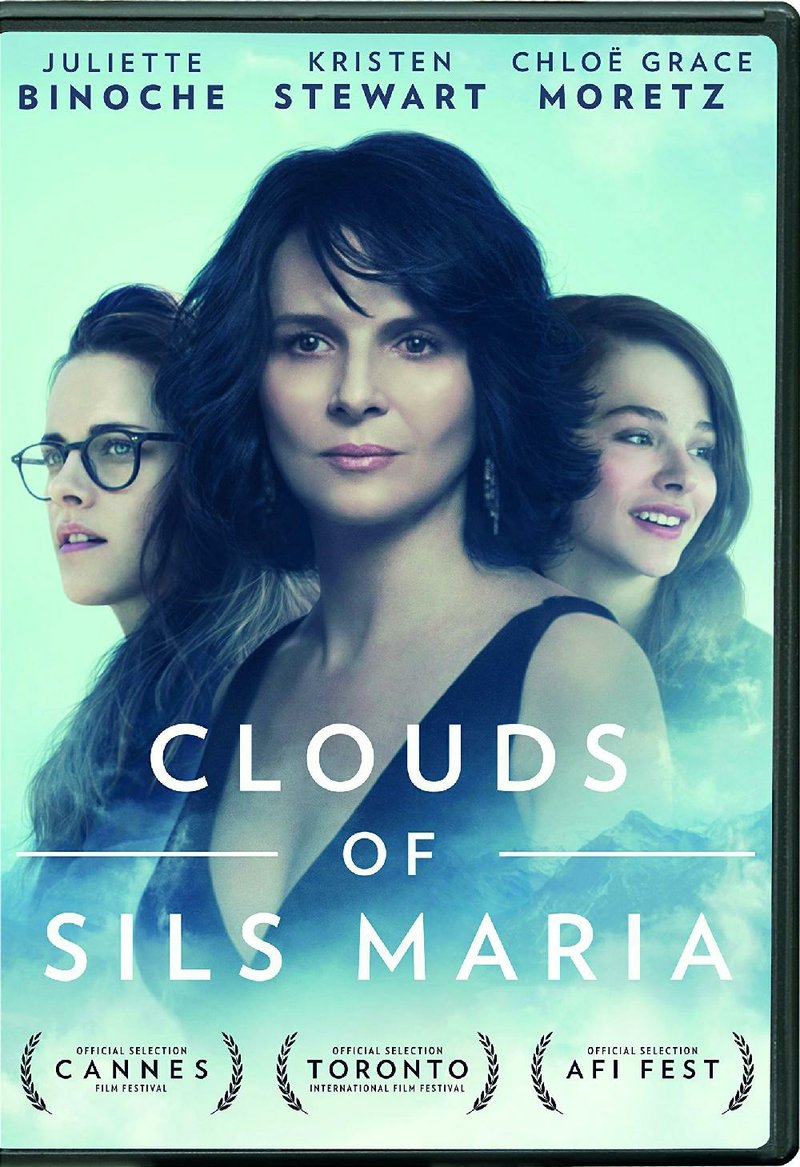Clouds of Sils Maria, directed by Olivier Assayas
(R, 124 minutes)
If most movies are like pop songs with familiar beats and predictable rhymes, Clouds of Sils Maria is more like a piece of chamber music, precise and balanced. It’s not loud, but if you listen you can become lost in its echoing motifs.
It is a superbly acted movie about how we reconcile our belief in ourselves as creatures of potential with the realization we’ve become settled and defined.
Maria Enders (Juliette Binoche) is a renowned actress who, after years of playing the ingenue, is transitioning into character roles. She’s on a train to Zurich to accept an award, accompanied by her assistant Valentine (Kristen Stewart) — a portal between the star and the world — who tries to balance Maria’s personal life with professional obligations while insulating her from rougher realities.
While in transit, an offer comes in for Maria to play the older woman in a revival of a play that launched her career 20 years earlier, with scandalous young Hollywood actress Jo-Ann Ellis (Chloe Grace Moretz) in the role Maria originated.
Maria is ambivalent about taking the role, but Valentine is enthusiastic. She’s a Jo-Ann fan, seeing in the young star something vigorous and authentic. Where Maria is possessive of the role she has aged out of, Valentine sees the part as a chance to do something courageous and invigorating.
Assayas has crafted a challenging and deeply engaging film that’s remarkably beautiful and grounded in universal experience. Clouds of Sils Maria is a story that emerges from everyday conversation and conventions, a rich consideration of character and mortality that feels completely organic despite a rather formal structure.
The Longest Ride (PG-13, 139 minutes)
Like most adaptations of Nicholas Sparks novels, The Longest Ride manages to drain all the vitality, credibility and passion from romance. Sparks produced this one, so every irrelevant detail, every corny line of dialogue (“Love requires sacrifice”) and every shrill supporting character makes it into the final cut. Little of it is genuinely moving.
Director George Tillman Jr. is credited with directing the movie, but it’s hard to tell the difference between his work and the work of anyone else who has made a film of a Sparks book, like A Walk to Remember and The Best of Me.
About the only thing that feels authentic is the genuine North Carolina scenery, which has more depth, sincerity and beauty than the people who inhabit it.
The Longest Ride is about professional bull rider Luke Collins (Scott Eastwood, Clint’s son) and his attraction to Wake Forest University art student Sophia Danko (Britt Robertson). He wants to ride angry beef and she wants to sell contemporary art. The film includes a lot of gags that sneer at abstract paintings and the foolhardy thrills of lasting eight seconds on top of a bull. Apparently the filmmakers don’t care much about either art or bull riding, because both worlds get shortchanged.
Sparks’ story lines don’t progress so much as they drag from one annoyingly predictable plot point to another. With a dearth of romantic rivals or genuine obstacles to the coupling that happens before the opening credits, the path to love seems drearily dull.
The Second Best Exotic Marigold Hotel (PG, 122 minutes)
The precursor to this film, The Best Exotic Marigold Hotel (2011) is about an entrepreneurial young Indian named Sonny (Dev Patel) who opens a seedy-chic (and very cheap) residential hotel designed to attract British retirees. It was a surprise hit because it grants older folks — an underserved segment of the moviegoing market — a full complement of human emotion.
This funny, charming sequel is populated by likable actors, including Judi Dench, Maggie Smith and Bill Nighy, who are engaged in a project where aging is treated as something that happens to fortunate people. It’s good to see a movie where people who’ve reached retirement age are considered vital and viable, not simply devices through which sympathy or laughs can be bought.
While the humorless might frown at the echoes of imperialism inherent in the idea of pensioned Brits cavorting in the subcontinent, the film is gentle and respectful, and the only Indian character who really comes off as a fool is Sonny, the hotel’s obsequious and scheming owner. With David Strathairn, Richard Gere; directed by John Madden.
Ex Machina (R, 108 minutes)
If there’s one thing you can hold against Alex Garland’s carefully wrought directorial debut, it’s the way the film seems to exist outside of a world in which everybody knows exactly what will happen if you pursue the artificial intelligence angle too successfully: That all this intelligence and self-awareness will eventually lead the creation to rebel against its handlers and run amok.
Reclusive multi-billionaire Nathan Bateman (Oscar Isaac) spends his days working on a project designing the world’s first true AI interface. The AI in question, Ava (Alicia Vikander), is an expressive animatronic robot who quickly gains the trust of Bateman’s gifted young programmer Caleb (Domhnall Gleeson), warning him not to trust his boss, whose ulterior motives remain vague. Before we know it, rebellions are being hatched, freedom is being proffered, and creators are planned to be brought to an untimely end.
It Follows (R, 94 minutes)
A disturbing, tantalizing horror drama in which a suburban Detroit teenager (Maika Monroe) has a strange sexual encounter with a new boyfriend that is followed by nightmarish visions and terrifying consequences. With Jake Weary, Keir Gilchrist; written and directed by David Robert Mitchell.
